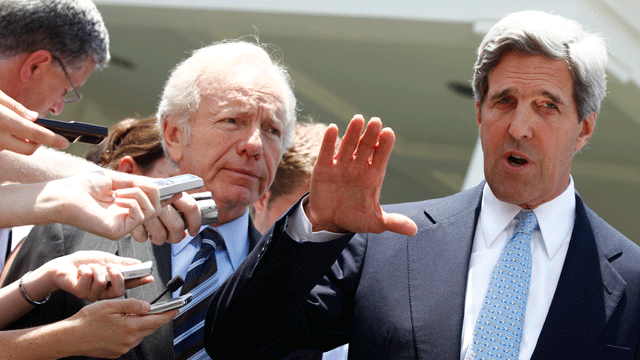
Sen. John Kerry, D-Mass., accompanied by Sen. Joe Lieberman, I-Conn., speaks to reporters outside the White House in Washington, Tuesday, June 29, 2010, after meeting with President Barack Obama to discuss passing comprehensive energy and climate legislation. (AP)
The authors of sweeping energy legislation that is stalled in the Senate said Tuesday they were prepared to scale back their bill to get GOP support. They swiftly appeared to win a convert as a key moderate Republican said she might support a more targeted approach.
Sens. John Kerry and Joe Lieberman made their comments after meeting at the White House with fellow senators and President Obama, who is pushing for action in the wake of the Gulf oil spill.
"We are prepared to scale back the reach of our legislation in order to try to find that place of compromise," Kerry, D-Mass., said after the meeting in which Obama urged senators to find common ground.
The bill by Kerry and Lieberman, I-Conn., would tax carbon dioxide emissions produced by coal-fired power plants and other large polluters as a way to reduce pollution blamed for global warming. The legislation has been panned by many Republicans as a "national energy tax."
A more modest approach would limit the carbon tax to the electricity sector, something Kerry said Tuesday was under consideration. The idea won a critical Republican endorsement from Maine Sen. Olympia Snowe after she attended Tuesday's White House meeting.
"I believe that one possibility is to more narrowly target a carbon pricing program through a uniform nationwide system solely on the power sector," Snowe said in a statement.
The chairman of the Energy Committee, Sen. Jeff Bingaman, D-N.M., is quietly drafting a bill that would do just that, and White House officials also have begun to speak favorably about the approach.
Heather Zichal, deputy assistant to the president for energy and climate change, said there was discussion Tuesday about an emissions cap just on stationary sources, which would primarily mean electricity plants.
"Based on the discussion today I think we feel good about opportunities to come together and find some common ground to pass legislation this year," Zichal told viewers in a forum on the White House website.
Senate Majority Leader Harry Reid, D-Nev., is aiming to bring energy legislation to the Senate floor in July.
Lawmakers also are pursuing numerous bills related to the oil spill, from raising the legal liability for oil companies to limiting deepwater drilling, though it's not clear whether those would be packaged separately or attached to a larger energy bill.
As drafted the Kerry-Lieberman measure aims to cut emissions of carbon dioxide and other heat-trapping greenhouse gases by 17 percent by 2020 and by more than 80 percent by 2050. The House passed its own comprehensive measure last year.




